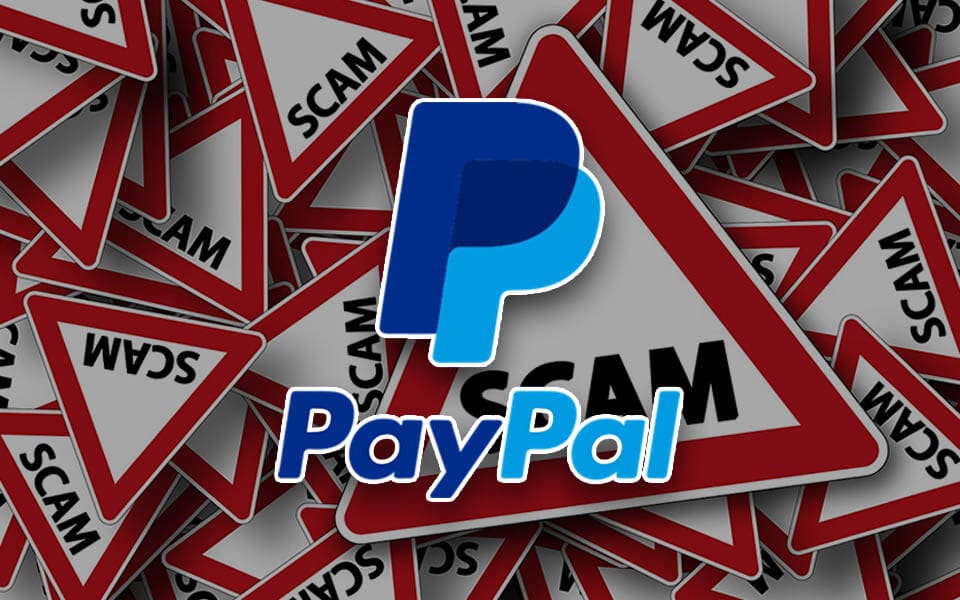
Paypal Scams can form a part of emails, phishing websites, malicious advertisements, dubious links, and more. Such frauds appear authentic and deceive users into disclosing personal information like usernames and passwords, thereby collecting cash fraudulently. There are many PayPal scams, but you’re more likely to encounter a few.
Paypal secured the position as the most outstanding payment service, founded in 1998. With Paypal, online users can transfer/receive money globally to/from friends and family, swiftly and safely. Its universal acceptance has been so dynamic that it can also be used across shopping portals. Top-rated brands such as Google Pay, Microsoft, Ikea, and Playstation Store are among the many adopting it as a payment channel. Paypal has approximately 361 million users, with an average yearly transaction count of 40 or more per user. It explains how popular it is within the industry.
Unfortunately, Paypal scams and attacks are known circumstances within this financial provision.
In This Article
- What are Paypal Scams?
- Common Paypal scams
- How does the Paypal Scam work?
- How to Spot a PayPal Scam?
- How to Avoid PayPal Scams?
- What to do if you are a victim of a Paypal scam?
- How to get money back from a Paypal scam?
- Why is Scam Recovery Expert a Trusted Name in the World of Paypal Scam Recovery?
- Why Choose Us?
What are Paypal Scams?
Are you wondering whether you could get cheated on Paypal? YES. The answer might disappoint you, but anyone carelessly moving money online could get scammed, and Paypal isn’t any different in that regard. Paypal scam occurs in several ways; they can be sourced via emails, fabricated sites, dubious links, software, fake ads, etc. In addition, some scammers may depend on the ignorance and blind faith delegated by the users to strike them. However, it doesn’t mean that you should avoid using such platforms.
A few baby steps could help you obstruct these scams. For instance, examining the sender, information related to the seller, the authenticity of the website, etc.
To safeguard yourself from grueling and rising Paypal frauds, you should first pick a few things on how they operate, what they do, and more. Then, scroll on to learn more about it.
Common Paypal scams
Let us get a run-through of some of the common Paypal scams;
Paypal Overpayment Scam
It is a crafty and unfathomable Paypal scam. In this Paypal Overpayment scam, the deceptive buyer tricks the seller by overpaying for a product, then the buyer reaches out to the seller and requests a refund for the excess money. In addition, they may give clarifications on why they paid the surplus. Once the seller processes the overpaid amount, the buyer may claim that they never made a purchase or that there has been some misunderstanding. The scammer then cancels the order, seeking a full refund of the original price. Unfortunately, the seller incurs a loss as they pay twice the overpaid amount.
The Paypal overpayment scam may unwind in varied ways. For instance, unauthorized and overpaid purchases also occur from buyer accounts without their awareness.
Shipping scams find unconventional methods to defraud sellers. The most widespread technique involves the buyer associating their purchase order to an address different from their residential location. While they may or may not receive the product at the given address, they assert that they haven’t been delivered with any item. Further, these swindlers demand a refund despite attaining the purchased goods. Some Paypal shipping scammers go as far as filing a chargeback claim, playing the victim, and calling in for repayment.
Other shipping frauds include;
- the buyer manipulating the seller into linking their purchase to their preferred shipping agency,
- The seller levies excessive shipping charges with an excuse that the product has been imported, among other shipping frauds.
Paypal Email Scam
Getting fake Paypal emails isn’t out of the ordinary. Scammers create distinctive and creative emails to make recipients fall for their trap. You are getting phished if you obtain an email from Paypal with a suspicious link that urges you to log in to resolve an issue with your account. Additionally, some crooks create and send fake screenshots of a payment made via Paypal on the Paypal scam email. They notify the seller that their Paypal payment for the product has been through, but the delivery is on hold since they do not have shipment details. The seller is then asked for the shipment ID, tracking number, and other information. Most merchants give in to such requests as they value customer experience and want to steer clear of purchase errors. The fraudulent buyer draws away with a free product by misleading the seller.
Paypal Advance Payment Scams
It’s a classic free-money scam. However, anything that reads or screams free money is outright fraud. These advance payment scams connect to naive users under the pretense of Paypal, exclaiming that the user has won a tremendous amount of money. It could be represented as a lottery, payment from someone who owed you, or your secretive inheritance. The problem is that the victim is requested to fill out and submit their personal details along with an advanced fee that will process the free fund. They may even label the advance fee as a qualification amount or tax chargeable against the free fund. Sadly, once the victim processes the fee, they lose their money and acquire nothing but discontent against it.
Paypal Phishing Scam
Phishing scams are everywhere, and you can spot them across each operations category. Let’s narrow it down to Paypal phishing frauds and elaborate more on them. The deceitful person works with a list of targets who can be emailed through their fake Paypal account. They develop convincing storylines to make their sent link hard to resist. These click-worthy links may ask the receiver to verify their account, share their sensitive details, or log in. The Paypal phishing email may look and feel like a formal email from an acclaimed firm. However, once the con artist gains access to your Paypal account, they wipe out all your funds without prior notice.
Paypal Fake Account Scam
Counterfeit parties locate many devious methods to spoof Paypal accounts. These types of frauds are also referred to as synthetic identity fraud. The impersonator does an incredible job at making their account appear like the real deal, with a thorough profile of a firm or person who doesn’t even exist.
The most prevailing fake PayPal accounts function under the pretext of a phony charity, investment firm, or online shopping site. These scams grab your attention with catchy ads, promos, or offers, leading to significant donations or purchases through Paypal.
Paypal Text Message Scams
It has been a widespread and recurring fraud in recent times. In this scam, users get pinged by a duplicated Paypal account with a transaction alert. Such Paypal spams notify the target of suspicious activity or transfer done from their account. They are further urged to connect to them or click on some link within a stipulated time length. Once the target clicks on the link or reaches out to the swindler, the dishonest party guilefully acquires their personal details and Paypal login.
Compromised Paypal Account Scam
A Paypal account stolen, hacked, or phished by a fraudulent person could be another concern everyone should look out for. While the scammer continues to buy products or transfer money as per their wish from the compromised account, the account holder might have to deal with the repercussions. Such hacks might happen without your knowledge.
How does the Paypal Scam work?
Now that we’ve gone through the frequently occurring Paypal scams, you have a gist of how these scams surface, operate, and spread across various platforms. You could be contacted via calls, text messages, social media, emails, or any other means. Still, the idea remains the same, the scammer misleads and unanticipatedly strikes some persuasive narrative, ultimately stealing money from the unprepared Paypal users. The list of Paypal frauds demonstrated above isn’t all-inclusive since so many new and unknown scams are constantly emerging and operating undercover.
Hence, it is in your best interest to learn some successful ways to identify and prevent them while you still can.
How to Spot a PayPal Scam?
Here are some simple and effortless practices that you could use while identifying these terrifying Paypal scams;
- Genuine service providers like Paypal won’t ask you to click on a link or share sensitive information.
- Scrutinize URLs before you click on them.
- If you are notified of any login issues, attempt logging into your official Paypal account first before entertaining such requests.
- Check whether the email address matches the official Paypal email address.
- Verify your order or shipping details before purchasing or checking out.
- Report any seller or Paypal representative if you feel they are being pushy or rushing you into making a hasty decision.
- Do not approve purchase orders from buyer accounts that are already blacklisted.
- As a seller, it is unsafe to proceed with a shipping address that does not match the address saved on the buyer’s account.
- If you have noticed suspicious activities among your potential buyers, you can consider blacklisting them.
- Watch out for red flags such as grammatical errors and significant glitches on a website, email, or text message.
- Emails with hideous links attached are generally phishing emails.
- Big firms like Paypal won’t use general salutations such as “Dear Paypal user” or “Hello Paypal member.” Instead, they would stick to your First or Last name.
- They will certainly not invite you for software upgrades.
How to Avoid PayPal Scams?
With an uproar of Paypal account hacks, deceptive practices, and other felonies, users must safeguard themselves and their money against any possible misconduct. Hence, our experts have assembled some tips and advice to help you prevent these scams;
- Join Paypal’s seller protection program, which will reimburse you in case of credit card scams.
- Set limits on your transactions, online shopping, or credit line. It’ll stop all your funds from clearing out when under the control of a scammer.
- Do not click on any suspicious links unless you have verified the source.
- You should keep your financial and login details secure. Do not share these personal details with anyone.
- Avoid purchasing services or products from unfamiliar sites or delivery partners.
- Don’t fall for free offers, alluring rewards, or excessive discounts. Not everything that glitters is gold.
- Prevent downloading software, files, or documents that seem suspicious. Besides, legitimate providers like Paypal would not send you such documents or software via email or any other platform.
- As a retail or online seller, keep records of your buyers.
- You don’t have to make hurried decisions only because someone is building pressure around you. If it is genuine, it could wait.
- Don’t blindly trust strangers or give in to their stories. Never wire your money unless you have established the person’s true intentions.
What to do if you are a victim of a Paypal scam?
Paypal scams are one of the worst of their kind since it directly gets your finances involved. And no one knows for sure how big the fraud could go. However, if you have lost your finances or its worth in any of the Paypal scams, we’ve got a few solutions for you. It isn’t the end of the world, Pal!
- Paypal serves its large user base with two separate Seller and Buyer Protection Programs. It implies they highly discourage any attempts of treachery or illegal breaches and aim to protect the rights of their users. If you are a member of these programs, you can raise a dispute with their assistance.
- While Paypal’s initiative at securing its users is astounding, it might not achieve success in bringing justice to each victim. In that case, you can consider getting help from industry experts. Fund recovery firms are your answer here.
- Scam Recovery Expert is a universally acclaimed fund recovery practitioner who has helped thousands retrieve millions lost to widely ranging catastrophic frauds. Consider ringing us if you want your Paypal funds back the correct route.
How to get money back from a Paypal scam?
The longer your money is in the hands of fraudsters, the less likely you are to get it back, so be sure to follow the procedure and move promptly. Additionally, PayPal’s capabilities are limited to its software; therefore, if the funds are taken and transferred to a bank account, the platform is practically powerless to stop it.
Our experts at Scam Recovery Expert have worked in the chargeback industry for years, returning more than $3 million to the rightful owners. After a brief phone contact or a consultation with a staff member, our experts will start working on your case, tracking down the culprits and recovering your money. So contact us immediately and let us know how we can help.
Why is Scam Recovery Expert a Trusted Name in the World of Paypal Scam Recovery?
Trust isn’t built or accumulated overnight. Scam Recovery Expert believes in customer-centric solutions, as each reported case demands due attention and careful inspection. Our specialized services are the source of our customer’s faith in us. Our zeal to fight through situations where people have already lost hope is all the more reason why people rely on us. While we bring impressive numbers and case closures to the desk, we promote disciplinary conduct and awareness within the digital space, which has won us more hearts.
Why Choose Us?
It started as an attempt to support an online fraud victim with technologically and legally backed solutions; Scam Recovery Expert set its foot steady and slow. But over the years, we have expanded across the continent, majoring in detecting fraud and deceit. Soon our long-rooted branches into scam recovery earned a trusted name. Our work for our clients has rendered an abundance of faith in us.
Trust isn’t the only reason why our clients count on us. Here are some more reasons why people favor us;
- In a world where people have confronted fake reassurances repeatedly, we bring results that speak volumes.
- Our experts can make recommendations and remarks relating to the case since they know best what moves within their domain. Our flexible work culture helps us touch gray areas that are otherwise tough to spot.
- Scam Recovery Expert provides transparent resolutions where our clients are updated and informed of each alteration and progress of their case.
- Our goal isn’t only to identify frauds and recover money; we also aim to educate online users on all the threats and deceits that await to prey on them. With the same intention, we post an assortment of data on different frauds, how they operate, how to spot them, etc.
- We work for the welfare of the user’s online rights and financial security.
FAQs
Keep your bank statements in check. If you spot any suspicious transactions on your Paypal account, you may have been a victim of a Paypal scam. However, don’t forget that these types of fraud emerge in various patterns. Hence, it is not easy to detect it. If you are unsure whether you were scammed, you can call Paypal or sign up for fund recovery assistance, who can study your case and investigate on your behalf.
Maybe you’re wondering how to get your money back from a scammer, or perhaps you want to know how to get a PayPal refund from a fraudster if the item you received is defective, broken, or not what the phony seller said it would be.
Recover money from paypal scams:
You could try demanding a refund if you have the contact details or a founded communication channel to reach out to the scammer. Generally, con artists are clever. They manage to vanish and clean up their footprints along the way. Next, you could confirm whether Paypal can be of any help. Depending on the scam and your eligibility for their protection program, they may convey what they can do for you. Finally, the ideal step would be consulting a recovery agency like Scam Recovery Expert. You can expect a definite fund recovery solution with investigators, cybercriminal specialists, advocates, compliance officers, and other experts on their team.
If you’ve concluded that there isn’t much you can do after turning a victim to a Paypal hoax, then you’ve got it wrong. Stop regretting what you lost and work on what you could protect and recover. Here are a few steps to report scam after being scammed on Paypal;
How to report a paypal scam:
- File a complaint with the state authority and Block the fraudulent user. It will aid other people in recognizing them.
- Make a complaint to Paypal so they can blacklist them.
- Contact Scam Recovery Expert, where our experts help you to trace the scammer and retrieve the money you misplaced.
- Practice caution so you can avoid scams like these in the future.
Different scams may function with varied stories, techniques, or platforms but generally target identical results. In most events, a scammer only has their eyes on your money. In other cases, they may rob money’s worth, such as your investments, products, services, etc. Some may steal your personal information, passwords, and more to get their hands on your finances. The extreme case scenario also encompasses deceptive parties spoofing the user account and scamming many more.
In conclusion, there is no limit on the amount of destruction a scammer could cause through their wily deeds. But what you could set are grounds on how you deal with such con artists. Be vigilant so you don’t have to suck up to unexplained losses.
Scam Recovery Expert examines the most prevalent PayPal Scams. You can get your money back by approaching our fund recovery experts. For more assistance, Contact our customer care.
Online payment applications like Paypal, Google pay, Venmo, and Zelle are a secure and fast way to transfer payments while purchasing a product in person or through shipped items. In addition, they’re trustworthy and don’t directly divulge your bank details to anyone. But in some cases, you need to be very careful about Paypal as most of these rising scams are ongoing.
After a Paypal scam, the first thing you should do is file a PayPal fraud report. Although it doesn’t technically replace the money, it does provide you the option to get money back in cases where things weren’t delivered or received or if you thought there had been a fraud. However, as was already noted, these scams give con artists access to your money; thus, Paypal has its drawbacks. Additionally, if you use the relatives and friends tool, PayPal’s refund options are entirely out of the question. There are several cases of angry people who are left with no money online after dealing with Paypal scams.
Thankfully, you need not worry too much about calling Paypal’s service number and sending a plethora of emails expecting a fast reply. Instead, you can start your fund recovery process by contacting the Scam Recovery Expert team, which will move much faster and get you through to the designated team on your first attempt at calling.
In most cases, the fraudsters will steal your personal details, security keys, and your funds. However, in the worst-case scenario, fraudsters also enclose dishonest parties copying the client’s account and withdrawing their funds without the client’s involvement. As a result, the clients are unable to open their account or check their balance; but at this stage they get to know that they are scammed.
The emails from PayPal manipulate the feature where you can request funds from other clients via the website. With PayPal Request funds, you can share an email or SMS requesting payment. The recipient will obtain either an email or message with a link to make a payment directly to your PayPal wallet. Unfortunately, these proposals can count as a note, which fraudsters use to create a message and pressure the recipient into transmitting money for a completely unexpected service.
If you feel you are a target of a Paypal scam, then immediately secure your Paypal account. Change the password to something safe and strong, and inform the Paypal service if you have lost your funds to a PayPal scam. In some rare cases, Paypal will provide a refund, but it is not guaranteed. So, it is better to contact Scam Recovery Expert, where our expert team will help you with the legal procedure and reclaim your funds from scammers.
Want to retrieve your money lost to Paypal scam? Reach out to Scam Recovery Expert and kickstart your recovery process.


